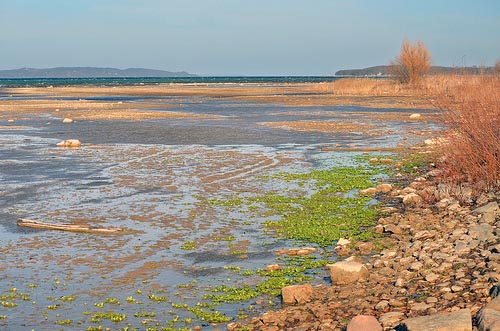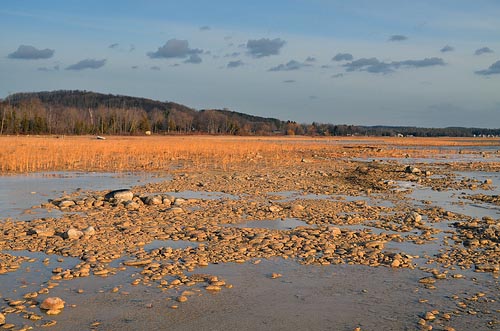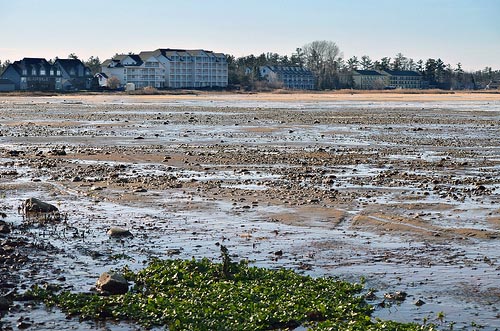Lowest recorded Great Lakes water levels basis for Great Lakes Levels 101 program
Michigan Sea Grant and Michigan State University Extension will host a free public program on Lake Michigan water levels with US Army Corp of Engineers, Northwestern Michigan College and Michigan Department of Environmental Quality.
Visitors and residents to the shoreline of any parts of Lakes Michigan and Huron have noticed the significantly low level of the water and the vast amount of exposed  bottomland, formerly covered by water. Since the late 1800s, lake level records have been recorded for Lake Michigan and Lake Huron, and since 1918, the US Army Corps of Engineers has maintained lake level records on a number of gaging stations. Because wind and pressure can set up daily movements of the water, the gage records are averaged to even out for such fluctuations. Each month of the year, thus, has a “lake level average”. As it stands, both December 2012 and January 2013 have broken or will break the all-time record lows for each of those months on Lake Michigan. It is highly probable, as well, that February 2013 will be the lowest monthly average ever recorded on Lake Michigan—besting the previous monthly record low recorded in March 1964.
bottomland, formerly covered by water. Since the late 1800s, lake level records have been recorded for Lake Michigan and Lake Huron, and since 1918, the US Army Corps of Engineers has maintained lake level records on a number of gaging stations. Because wind and pressure can set up daily movements of the water, the gage records are averaged to even out for such fluctuations. Each month of the year, thus, has a “lake level average”. As it stands, both December 2012 and January 2013 have broken or will break the all-time record lows for each of those months on Lake Michigan. It is highly probable, as well, that February 2013 will be the lowest monthly average ever recorded on Lake Michigan—besting the previous monthly record low recorded in March 1964.
 In order to explain lake level variations, hydrologic system inputs and outputs, and historical lake level records, Michigan Sea Grant Extension and Michigan State University Extension are hosting a free public seminar on Great Lakes Levels 101, on February 4, 2013 from 6:30 pm – 8:30 pm, at the Grand Traverse County Civic Center meeting room (1213 West Civic Center Dr., Traverse City 49686). This program is designed to provide information for shoreline owners and interested citizens on current record low lake levels on Lake Michigan. The program includes ample time for moderated questions and answers from state and federal representatives.
In order to explain lake level variations, hydrologic system inputs and outputs, and historical lake level records, Michigan Sea Grant Extension and Michigan State University Extension are hosting a free public seminar on Great Lakes Levels 101, on February 4, 2013 from 6:30 pm – 8:30 pm, at the Grand Traverse County Civic Center meeting room (1213 West Civic Center Dr., Traverse City 49686). This program is designed to provide information for shoreline owners and interested citizens on current record low lake levels on Lake Michigan. The program includes ample time for moderated questions and answers from state and federal representatives.
The Levels 101 program is co-sponsored by Northwestern Michigan College’s Great Lakes Water Studies Institute, the US Army Corps of Engineers, and the Michigan Department of Environmental Quality (MDEQ). Speakers for the event include:
- Mark Breederland, Educator, Michigan Sea Grant Extension/MSU Extension, Traverse City
- Keith Kompoltowicz, Chief of Watershed Hydrology, US Army Corps of Engineers, Detroit
- Hans Van Sumeren, Coastal Engineer and Director, NMC Great Lakes Water Studies Institute, Traverse City
- Robyn Schmidt, Michigan DEQ Water Resources Division, Cadillac
- Jeff Fritsma, US Army Corps of Engineers Regulatory, Grand Haven
State and federal laws and regulations apply to bottomlands below the “ordinary high water mark” and personnel who deal with these issues for the Northwestern Lower  Michigan region (from both the US Army Corps of Engineers and the MDEQ) will be on hand to answer regulatory issue questions.
Michigan region (from both the US Army Corps of Engineers and the MDEQ) will be on hand to answer regulatory issue questions.
Speakers will also discuss observations from the long-term data set that exists for lake levels information on the Great Lakes. For instance, just four years after the lowest monthly record low in March 1964 and the lowest yearly low in 1964, the Lake Michigan-Huron levels bounced above the long-term yearly average in 1968. Currently, however, the yearly average of Michigan-Huron has not been above the long-term average since 1998, making this a string of 14 consecutive years below average.
For more information about the Great Lakes Level 101 program or lake levels, contact Mark Breederland at 231-922-4628.



 Print
Print Email
Email


